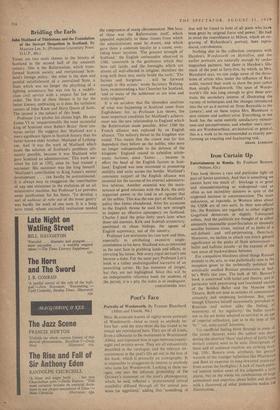Bridling the Earls
John Maitland of Thirlestane and the Foundation of the Stewart Despotism in Scotland. By Maurice Lee, Jr. (Princeton University Press: O.U.P., 48s.) THERE are two main themes in the history of Scotland in the second half of the sixteenth century. One is the Reformation, which trans- formed Scottish society and reorientated Scot- land's foreign policy : the other is the slow and painful establishment of a centralised State, a State which was no longer the plaything of a fighting aristocracy but was run by a middle- class civil service with a respect for law and order. The first of these themes is by far the better known, embracing as it does the turbulent careers of John Knox and Mary Queen of Scots. The second is the subject of this book.
Professor Lee pitches his claims high. He sees James VI as 'unquestionably the most successful king of Scotland since Robert Bruce' three cen- turies earlier. He suggests that Maitland was a more significant figure in Scottish history than his better-known elder brother, Maitland of Lething- ton. And 'it was the work of Maitland which made the solution of Scotland's problems ulti- mately possible, because it was Maitland who gave Scotland an administration.' This work sur- vived his fall in 1592, since he 'had trained a successor. His successor was the king himself.' 'Maitland's contribution to King James's mental development . . . can hardly be overestimated.' It is always easy to exaggerate the contribution of any one statesman to the evolution of an ad- ministrative machine, but Professor Lee provides some justification for his thesis. `To develop a sort of noblesse de robe out of the lesser gentry' was hardly the work of one man. It is a long- term trend, whose successful realisation needed the congruence of many circumstances. Not least of these was the Reformation itself, which appealed especially to those classes from which the administrators must be drawn, and which gave them a common loyalty to a cause, over- riding lesser loyalties. 'The greatest strength of Scotland,' the English ambassador observed in 1588, 'consisteth in the gentlemen which they here call lairds, and the boroughs which are almost all well-affected in religion; therefore the king with these may easily bridle the earls.' The barons and burgesses . . . will be forward enough in this action,' wrote Secretary Walsing- ham, recommending a Star Chamber for Scotland, 'and so many of the noblemen as are wise and truly religious.'
It is no accident that the shrewdest analyses of what was happening in Scotland come from Englishmen; for, as Professor Lee shows, the most important condition for Maitland's achieve- ment was the new relationship to England which the Reformation made possible. After 1560 the French alliance was replaced by an English alliance. 'The military threat to the kingdom was ended. This meant that the crown was far less dependent than before on the nobles, who were no longer indispensable to the defence of the kingdom.' England ceased to subsidise aristo- cratic factions, since 'James . . . became in effect the head of the English faction in Scot- land.' England was now interested in promoting stability and unity across the border. Maitland's consistent support of the English alliance was essential for the success of his internal administra- tive reforms. Another essential was the main- tenance of good relations with the Kirk, the only organised power in the land to set against that of the nobles. This was the one part of Maitland's policy that James abandoned. After his accession to the English throne he used his new strength to impose an effective episcopacy on Scotland. Charles I paid the price forty years later when those old enemies, Kirk and Scottish aristocracy, combined to chase bishops, the agents of English supremacy, out of the country.
Professor Lee overstates his case now and then, especially in attributing excessive single- .mindedness to his hero. Maitland was as interested as the next Scot in grabbing lands and offices, in elevating his house. Not every royal servant's son became a duke. For the most part Professor Lee's book is a rather undistinguished'narrative of an unexciting career. He has moments of insight, but they are not highlighted. Since this will be an indispensable reference book for students of the period, it is a pity the index is so inadequate.
CHRISTOPHER HILL


































 Previous page
Previous page